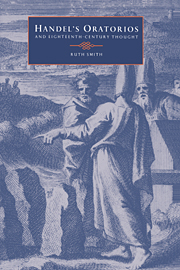Book contents
- Front Matter
- Contents
- Acknowledgements
- Abbreviations
- Introduction
- PART 1 ENGLISH ORIGINS OF ENGLISH ORATORIO
- Chapter 1 Artistic norms
- Chapter 2 The purpose of art
- Chapter 3 Music, morals and religion
- Chapter 4 The biblical sublime
- Chapter 5 The survival of epic
- Chapter 6 The defence of Christianity
- Chapter 7 Towards oratorio
- PART II THE PATRIOT LIBRETTO FROM THE EXCISE BILL TO THE JEW BILL: ISRAELITE ORATORIOS AND ENGLISH POLITICS
- Appendix I Libretto authors and sources
- Appendix 2 The oratorios and Methodism
- Notes
- Bibliography of sources cited
- Index
Chapter 4 - The biblical sublime
Published online by Cambridge University Press: 22 September 2009
- Front Matter
- Contents
- Acknowledgements
- Abbreviations
- Introduction
- PART 1 ENGLISH ORIGINS OF ENGLISH ORATORIO
- Chapter 1 Artistic norms
- Chapter 2 The purpose of art
- Chapter 3 Music, morals and religion
- Chapter 4 The biblical sublime
- Chapter 5 The survival of epic
- Chapter 6 The defence of Christianity
- Chapter 7 Towards oratorio
- PART II THE PATRIOT LIBRETTO FROM THE EXCISE BILL TO THE JEW BILL: ISRAELITE ORATORIOS AND ENGLISH POLITICS
- Appendix I Libretto authors and sources
- Appendix 2 The oratorios and Methodism
- Notes
- Bibliography of sources cited
- Index
Summary
The anthem compilers' appreciation of the textual detail of Scripture and their confident handling of their biblical material comes as no surprise to the literary historian. There is an enormous amount of writing from the eighteenth century both recommending the use of the Bible for modern literary composition and actually using it; here I shall refer principally to publications from the period of the oratorios and only to the main topics in the discussion that have particular relevance to the librettos.
Traditional esteem of the Bible as the whole, sufficient, truth for Protestant believers and of the Old Testament as matchless verse and prose was reinforced in the eighteenth century by the first-century treatise on rhetoric, On the Sublime (attributed at the time to Longinus though actually predating him), which received several translations from the late seventeenth to the mid eighteenth century and profoundly influenced English literature and criticism. As defined by Longinus, the chief distinguishing features of the sublime style and effect are ‘Boldness and Grandeur in the Thoughts’; ‘the Pathetic, or the Power of raising the Passions to a violent and even enthusiastic degree’; ‘a skilful Application of Figures, which are two-fold, of Sentiment and Language’; ‘a noble and graceful manner of Expression … not only to chuse out significant and elegant Words, but also to adorn and embellish the Stile, by the Assistance of Tropes’; and ‘the Structure and Composition of all the Periods, in all possible Dignity and Grandeur’.
- Type
- Chapter
- Information
- Handel's Oratorios and Eighteenth-Century Thought , pp. 108 - 126Publisher: Cambridge University PressPrint publication year: 1995
- 1
- Cited by



